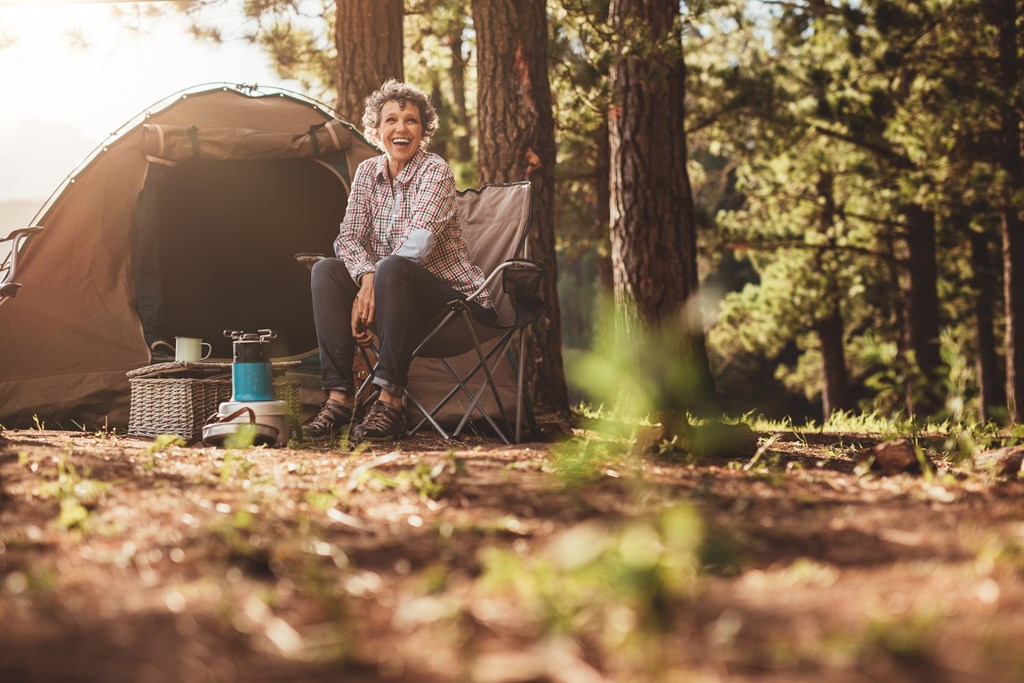
How to Camp Alone | Top Tips for Solo Camping Trips
You might think of camping as a bonding activity, but camping alone can also be a fun experience. Solo camping gives you the opportunity to escape your everyday life and practice mindfulness while you relax and reconnect with nature.
Sometimes, camping alone is just easier for your mental health. You can avoid coordinating schedules or stressing over having enough gear, food and sleeping bags. You get to be responsible for your own meals, meaning you only have to eat what you want, and you can choose all of your favorite relaxation activities.
Go camping on your time. Learn about the benefits of camping by yourself with this solo camping checklist:
Benefits of Solo Camping
Tips for Solo Camping
Solo Camping at KOA
THE BENEFITS OF SOLO CAMPING
Camping is an awesome activity to share with family and friends. But trekking out into the woods for a solo camping trip offers the solitude that a group camping trip simply doesn’t have. Even just a weekend trip to the woods can do wonders.
When you camp alone, you will spend your time around the fire reflecting on life rather than sharing stories, but your time will have great value regardless. Below are the benefits of solo camping for beginners.
1. GOING AT YOUR OWN PACE
When you go hiking with a group or participate in another strenuous activity, people have their own expectations about how fast or how far you will go. With a large enough group, what happens most of the time is that people break off into smaller groups or couples and go at different paces.
It’s hard to find a group where everyone is at the same level. When you camp alone, coordinating activities with others is unnecessary. You can go freely without planning to regroup at a certain hour and take your time when you want. You can hike quickly or slowly and stay up as late as you prefer.
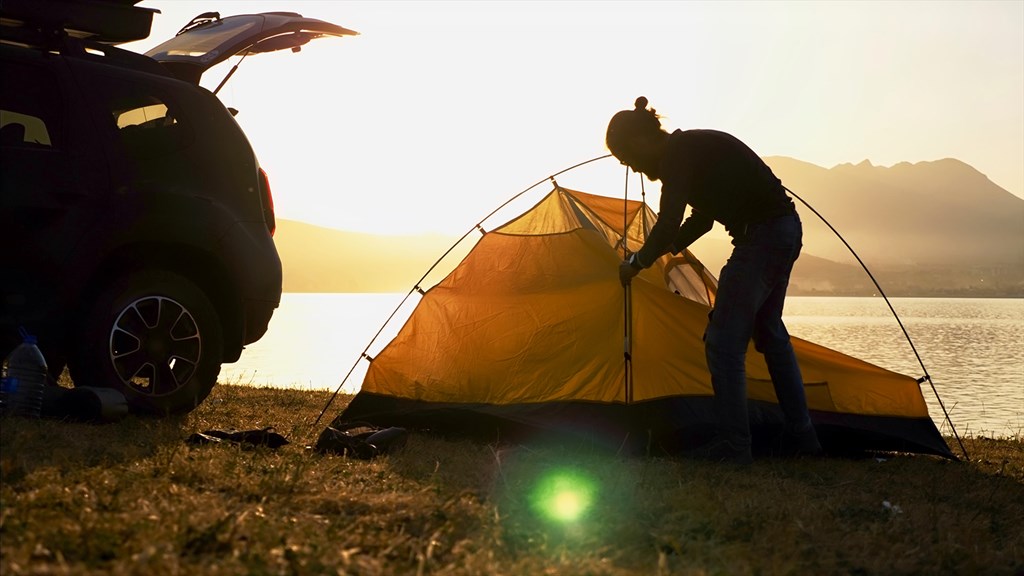
2. LEARNING TO CAMP LIKE A PRO
When camping in a group, one person usually becomes the leader and does most of the work. It is common to see someone setting up the tents on their own. Maybe another person always takes the initiative to start and tend to the campfire. You might even have someone with a very good sense of direction.
When you camp solo, all responsibilities are up to you. Having to do everything is how you can actually learn the most about camping. It will put you outside of your comfort zone and force you to be more independent than you would normally be.
The rewards and sense of accomplishment more than make up for the solitary nature of a solo camping trip. You will never be the same after watching the sun rise over the horizon from the campsite that you made while sipping the coffee that you just brewed over the campfire that you started!
3. MORE OF A CONNECTION TO NATURE
When camping in a group, you get caught up in conversations and forge stronger emotional connections. You have to make sure everyone stays happy during the trip and negotiate food and rest breaks. You end up spending a lot of your energy bonding with the people in your group.
When you go solo camping, you can connect with nature without having others around to distract you. This can lead to heightened awareness and a deeper connection. You have everything around you to see and experience without the noise and disruptions. You might even find that you appreciate the scenery more when alone.
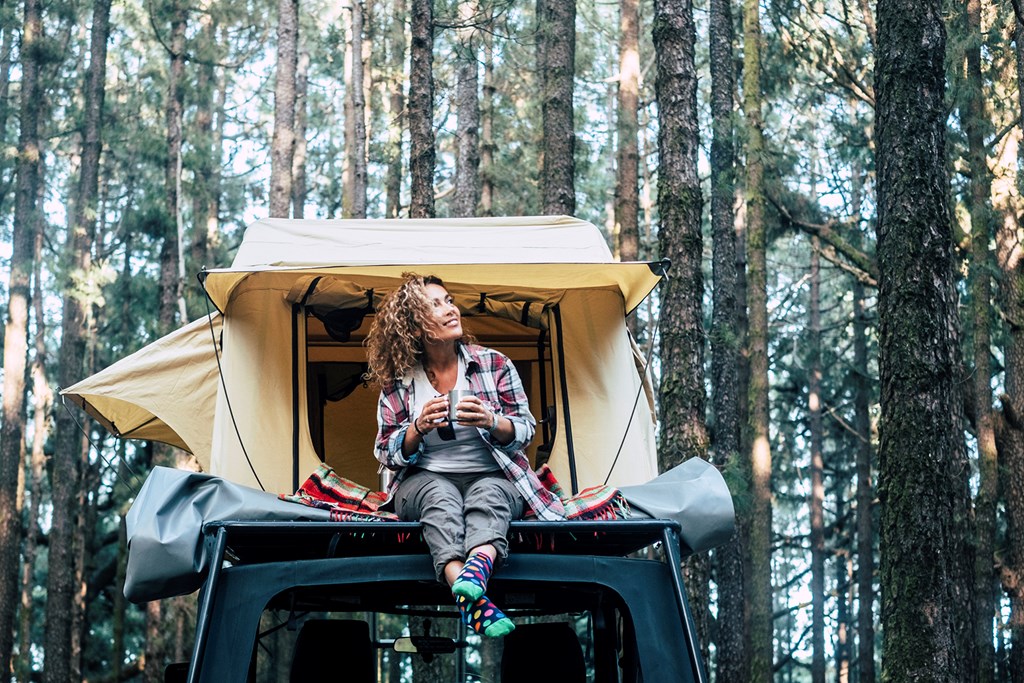
4. INCREASED SELF-CONFIDENCE
When you camp with a group, others are there to do tasks you feel uncomfortable with. Maybe you lack experience with equipment or don’t have the technical skills — this is why solo camping can be a challenge and a huge confidence boost when you learn new skills.
When camping alone, you have only yourself to rely on. You have to make sure you packed all of the correct supplies and be ready to improvise if you forgot to bring something. You learn to trust yourself more by going on a journey alone.
5. FEWER POTENTIAL STRESSORS
The stresses of making sure everyone in your group stays safe and gets along are always a concern in a camping party. One disagreement or incident can weigh heavily on the experience.
Camping alone might have certain stressors, but you can avoid the typical ones you always have when surrounded by other people. Allow yourself to relax away from the social stress of the outside world.
TOP FIRST TIME SOLO CAMPING TIPS
Now that you know the incredible benefits of solo camping, you are almost ready to embark on your journey and reap all the rewards of this time to yourself. However, there is one last thing — read over the below solo camping tips and follow what they say to ensure your camping trip is safe and enjoyable.
1. WORK YOUR WAY UP TO GOING SOLO
Your first solo camping trip absolutely should not be to some vast wilderness area. As they say, practice makes perfect, and you don’t want to overwhelm yourself your first time out. Solo camping requires a lot of different skills and starting out small is the best route to take.
Solo camping is best for those who have been camping with a group many times before. It is also a good idea to go solo camping in familiar areas that you know well to limit the possibility of getting lost or encountering an unexpected danger.
Gradually work your way up to more difficult camping situations. For example, if you want to work on your fire-starting skills, it is best to bring some backup tools in case you have trouble with your flint. Even skilled campers sometimes run into issues, so it’s best to learn basic skills first.
It won’t take long before you find yourself taking longer trips into more wild places, but make sure your skills are up to snuff first.
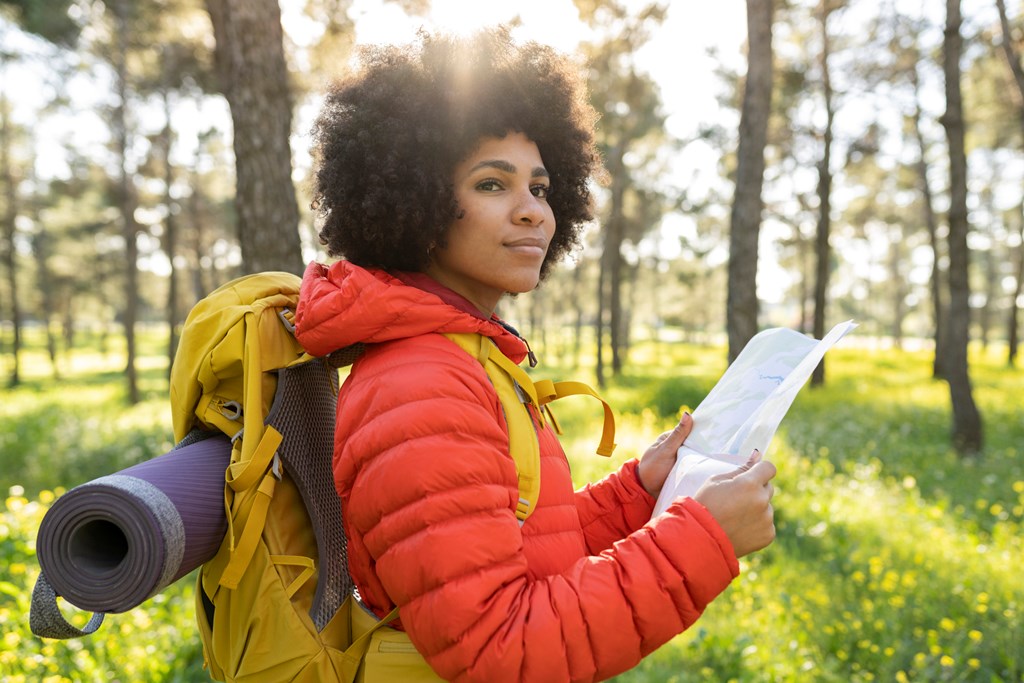
2. FEEL CONFIDENT ABOUT YOUR CAMPING SKILLS
Knowing the basics is crucial to camping alone, but you need to feel like your skill level goes beyond a beginner’s.
To successfully camp alone, you need to know how to do these important solo camping activities:
- Navigate
- Pitch a tent
- Build a fire
- Clean water, in case your supply runs out and you need to rely on creek water
- Set up camp
- Handle run-ins with wildlife, including big predators like bears
- Forecast weather so you do not end up stuck in a storm
- Deal with injuries and other things requiring first aid
Other things would be great to know before going out on your own, but the above list is the bare minimum you must be able to check off before you even think about heading out solo.
3. DON’T JUST GO FOR A NIGHT OR TWO
Sleeping alone in the wilderness is going to be uncomfortable. You’re somewhere new and unfamiliar and there is a lot your brain can trick you into worrying about. If you are only giving yourself a night or two on your solo journey, then you’re not going to reach the level of full enjoyment you’re after.
After a couple of restless nights, you’ll finally reach a point where you either become more comfortable or just so exhausted that you will be able to sleep much better.
4. LEARN HOW TO KEEP YOUR MIND CALM
One of the biggest hurdles of solo camping for many people is being alone in the woods, especially at night. It does not matter how many times we remind ourselves that monsters and Bigfoot are — probably — made up. As soon as the sun goes down and it is time to crawl into your sleeping bag, every snapping twig will still make you jump — at first. Over time, you’ll learn to recognize the sounds of the forest, and your comfort level will only increase.
There is no magic solution to getting over those fears, and they will probably always remain to some degree. The only way to get more comfortable is to spend time in the woods alone. You can try a strategy for coping with camping anxiety — mentally reassure yourself that everything is OK. If you start to feel overwhelmed from the panic setting in, give yourself a pep talk out loud. No one is around to hear you talking to yourself and think you sound silly.
Once you are at a point where you’re confident in your solo camping skill set, you can start to add additional activities to your excursions. Paddling and mountain biking are two great ways to add more excitement and fun to a solo trip into the wilderness.
5. LIGHTEN YOUR LOAD
Since you only have yourself to pack things in and out, be mindful of what you bring. You only need enough for yourself, so be realistic about what you pack for your camping.
Rather than lugging in a tent and a sleeping pad, many solo campers opt for a hammock that only requires the addition of a sleeping bag. If you prefer a tent, pick a lightweight one meant for one person.
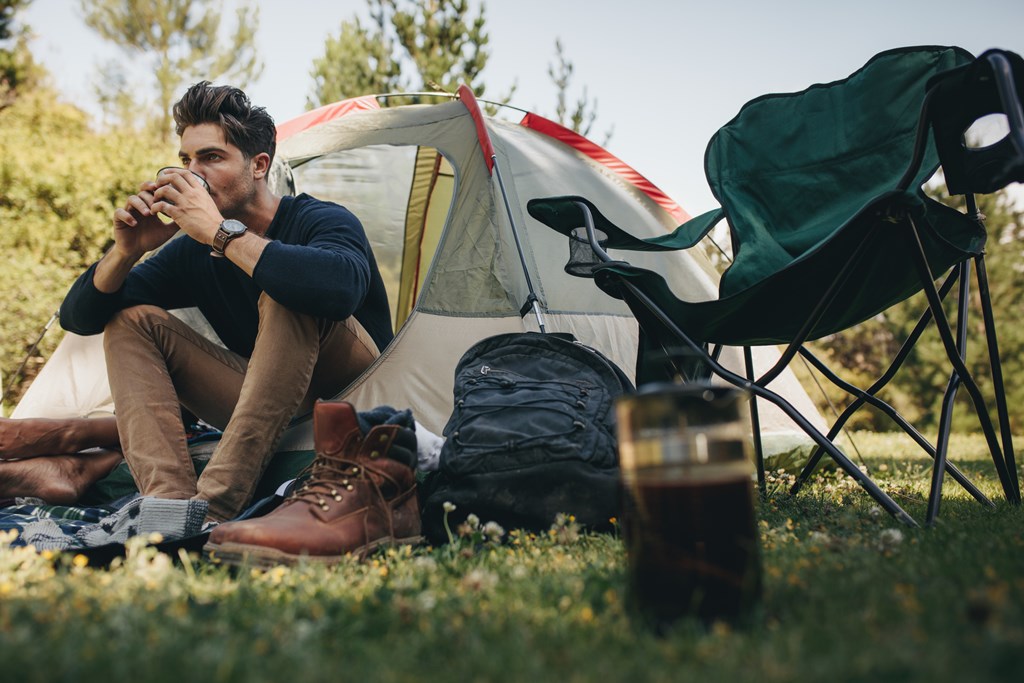
6. PICK SOMEWHERE CLOSE INSTEAD OF A FARAWAY PLACE
As a solo camping beginner, it is a good idea to pick a spot close to your home or one that is familiar. The further you go from what you know, the more distance you put between yourself and people who can help you, memorized trail systems and the comforts you have already come to know.
In fact, before going on your trip, head out to the area for a day hike or a bike ride to scout it out and get a feel for it. Knowing your camping area well will be an immense help in you feeling comfortable and relaxed.
7. SHARE YOUR PLANS WITH SOMEONE
As any camping guide worth their salt will advise — always tell someone you trust where you are going and what your camping itinerary looks like before leaving for a solo camping trip. Always give somebody a heads up before heading into the woods.
If something were to go wrong, knowing that someone can send help is a huge relief. This way, you can avoid a situation where you have to rely on your cell phone during an emergency. At the very least, someone needs to know the day you are leaving, the day you are coming back and where you are going.
8. TAKE SAFETY PRECAUTIONS
It is always better to be safe than sorry, especially when you’re out in the wilderness alone. Bring some sort of emergency device, satellite phone or a personal locator beacon with you. A satellite phone is a great way to check in with friends or family back home once in a while so they can rest easy knowing you’re safe.
If you plan to hike or explore the area around your campsite while solo camping, make sure not to take any unnecessary risks. An injury as simple as a sprained ankle will be something you simply won’t want to deal with. Remind yourself to move more slowly through the environment to minimize your risk of injury and allow you to really appreciate the beauty of nature.
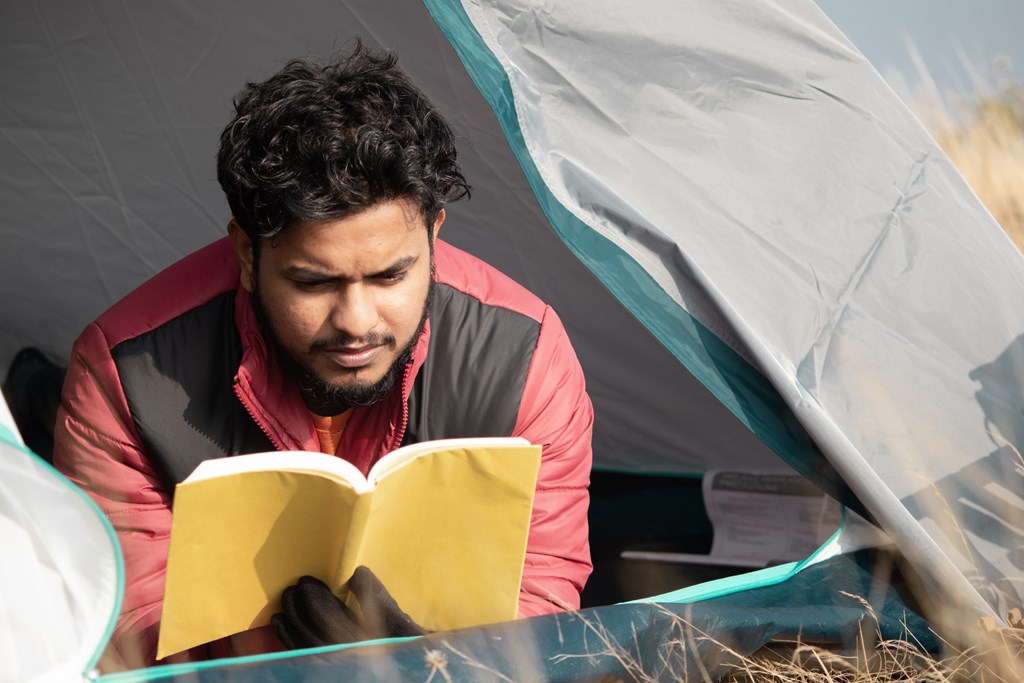
9. BRING A BOOK OR OTHER ENTERTAINMENT
Solo camping will also provide you with a lot of free time. What camping alone checklist would be complete without telling you to bring something to read? The camping time that is usually filled with conversation and storytelling when with a group won’t exist when you’re alone. You will probably be surprised at the amount of silence and spare time you’ll be swimming in. To help keep yourself company, bring along a good book. This will also serve as a great aid in helping you get to sleep.
A bird guide and set of binoculars are also a great interactive way to pass the time.
10. CAMP WITHOUT USING YOUR ELECTRONICS
If solo camping is something you can handle, here is a challenge. Leave your electronics in your bag. Not only will you probably lack good reception on your trip, but actually focusing on your surroundings is one of the best ways to recharge your mental batteries. You will miss your favorite music less once you learn to appreciate the sounds of nature.
Unplugging from our increasingly tech-dependent society is vital to our collective wellbeing. The constant bombardment of emails, text messages, alerts and social media updates can negatively affect your outlook on life. The initial lack of those things while camping on your own may come as a shock at first, but before long, you might discover that it brings you a newfound inner peace.
11. ALWAYS PUT YOUR SAFETY FIRST
Always plan ahead when you go on a camping trip. Make sure you also enter the wilderness alone with an escape plan. Know the best way to get out and the nearby areas you can go to for help if needed. Make sure you know what safety precautions to take, such as if you are in bear territory, and know who to contact for emergency services.
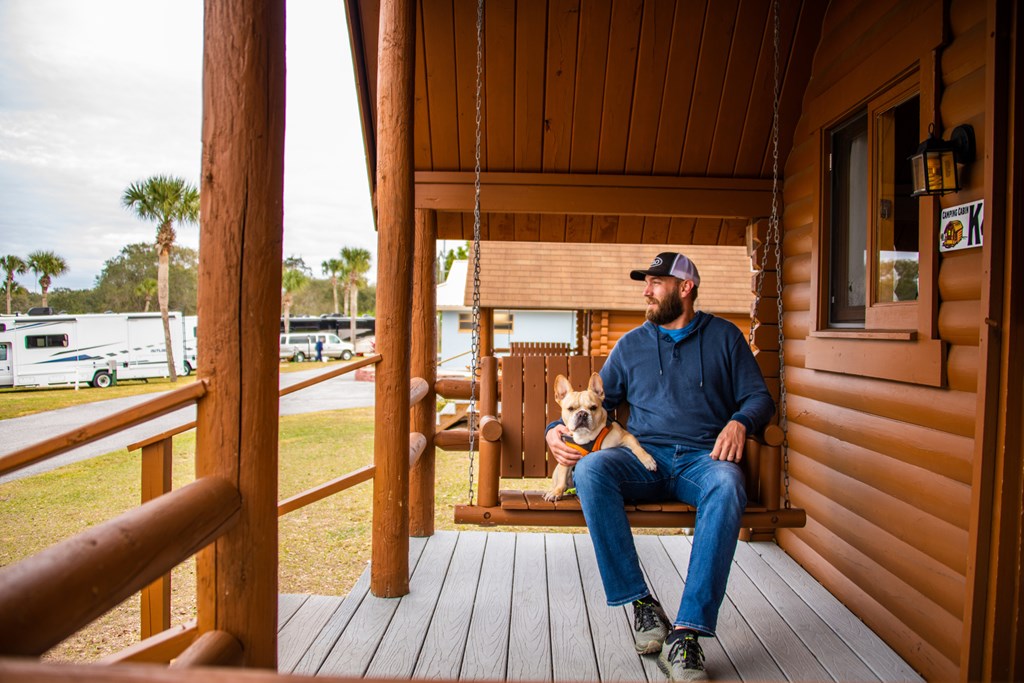
THE BENEFITS OF SOLO CAMPING AT KAMPGROUNDS OF AMERICA
If you are new to solo camping, staying at a KOA campground is a great place to begin. Seasoned outdoor adventurers also enjoy our services as a safe, relaxing break from the wilderness. The benefits of camping with KOA include:
- Safety: The campground is designed for your safety and you will know where the road is when it is time to leave.
- Access to supplies: If you need important supplies like firewood or water, the on-site KOA Store is open to campers.
- Bathroom facilities: You can walk to a real bathroom instead of using that chamber pot you keep inside your tent.
- Cleanliness: You can reserve a clean, flat site for tent camping instead of trying to find your own.
- Amenities: If you want to go camping in an RV, enjoy the hookups of an organized campground.
STAY WITH KOA
While many people build up the thought of solo camping to be impossible and only doable for expert campers, as you can see from the above, it is possible. As long as you are prepared, there is no reason you can’t head out and be one with nature on your own.
Camping solo is one of the most wonderful experiences you can have and it will connect you with yourself and nature in ways you never thought possible.
Are you ready to go solo camping? Find a KOA Campground near you and start planning your adventure today!

Leslie, a.k.a. Copy Girl, is a copywriter who gets butterflies from telling stories through words.
Her voice comes from a place filled with passion, dreams, and lots of sugar. “Cake over steak” is her go-to motto.
With over 10 years of experience in crafting words, and years of embarking on travels that have taken this Montana girl to some incredible places, Leslie love the adventures of both body and mind her writing takes her on.
Everywhere she goes, she takes this advice with her:
“Hold on to your divine blush, your innate rosy magic, or end up brown.” – Tom Robbins, Jitterbug Perfume
To see what Leslie’s up to in the writing world, visit her website here.
https://koa.com/blog/tips-for-your-first-solo-camping-trip/
Categories: Blog

